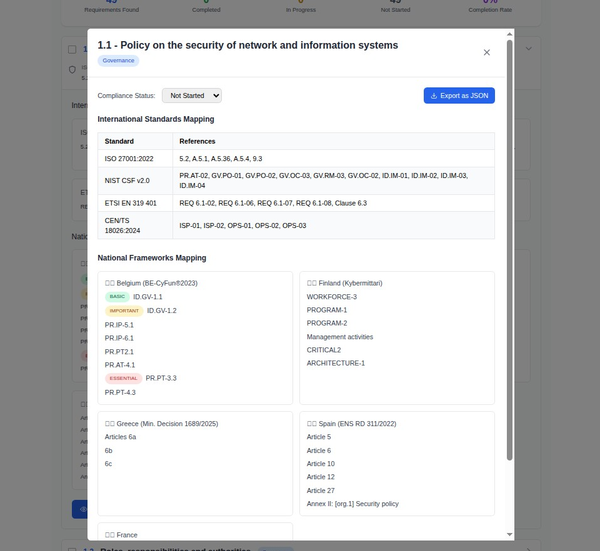Additional Ethical AI Initiatives in 2024

Introduction
As artificial intelligence (AI) continues to evolve, ethical considerations have become increasingly critical. Beyond the OECD AI Principles and UNESCO's Recommendation on AI Ethics, several other global and regional initiatives are shaping the ethical landscape of AI development and deployment. This section explores additional initiatives that have emerged or been reinforced in 2024 to ensure that AI technologies are developed responsibly and used ethically.

Additional Ethical AI Initiatives
1. European Union: AI Act
- Overview: The European Union has introduced the AI Act, a comprehensive regulatory framework that categorizes AI systems based on their risk levels and imposes stringent requirements on high-risk AI applications.
- Key Features:
- Risk-Based Regulation: Classifies AI systems into categories such as high-risk, limited-risk, and minimal-risk, with corresponding regulatory obligations.
- Transparency Requirements: Mandates clear documentation and explanation of AI system functionality, ensuring users understand how AI decisions are made.
- Human Oversight: Requires human oversight for high-risk AI systems to prevent and mitigate potential harms.
2. Global Partnership on AI (GPAI)
- Overview: GPAI is an international initiative aimed at bridging the gap between theory and practice on AI policy and ensuring that AI is used in a way that is human-centric and respects shared principles of human rights, inclusion, diversity, innovation, and economic growth.
- Key Features:
- Collaboration: Fosters collaboration among governments, international organizations, industry, and civil society to advance responsible AI development.
- Research and Innovation: Supports research on ethical AI practices and promotes innovation that aligns with ethical guidelines.
- Policy Development: Provides recommendations and frameworks for policymakers to create robust AI governance structures.
3. Institute of Electrical and Electronics Engineers (IEEE) Global Initiative on Ethics of Autonomous and Intelligent Systems
- Overview: The IEEE has developed a comprehensive set of guidelines and standards for the ethical design and implementation of autonomous and intelligent systems.
- Key Features:
- Ethically Aligned Design (EAD): Promotes the design of AI systems that prioritize ethical considerations and human well-being.
- Standards Development: Creates technical standards that embed ethical principles into AI technologies.
- Education and Outreach: Provides educational resources and training on ethical AI practices for developers and engineers.
4. World Economic Forum (WEF) AI Ethics and Governance
- Overview: The WEF has launched several initiatives to address the ethical implications of AI and ensure its responsible use in various sectors.
- Key Features:
- AI Governance Frameworks: Develops frameworks for ethical AI governance, focusing on transparency, accountability, and inclusivity.
- Sector-Specific Guidelines: Provides guidelines for the ethical use of AI in specific industries, such as healthcare, finance, and transportation.
- Public-Private Partnerships: Encourages collaboration between the public and private sectors to address ethical challenges in AI deployment.
5. AI4People
- Overview: AI4People is a European forum focused on developing a framework for the ethical use of AI that involves policymakers, industry leaders, and civil society.
- Key Features:
- Ethical Framework: Proposes an ethical framework that includes principles such as fairness, accountability, transparency, and sustainability.
- Policy Recommendations: Offers policy recommendations to ensure that AI technologies benefit society and minimize potential harms.
- Stakeholder Engagement: Involves a wide range of stakeholders in discussions about the ethical implications of AI.
6. Asia-Pacific Economic Cooperation (APEC) AI Principles
- Overview: APEC has developed a set of AI principles to guide member economies in the ethical development and use of AI technologies.
- Key Features:
- Inclusive Innovation: Encourages AI innovation that is inclusive and benefits all segments of society.
- Data Governance: Emphasizes the importance of robust data governance to ensure the ethical use of AI data.
- Cross-Border Collaboration: Promotes cross-border collaboration on AI ethics and governance to address global challenges.
7. African Union AI Guidelines
- Overview: The African Union has developed guidelines for the ethical use of AI, focusing on addressing the unique challenges and opportunities in African countries.
- Key Features:
- Human-Centered AI: Prioritizes the development of AI systems that enhance human capabilities and address socio-economic challenges.
- Capacity Building: Supports capacity building and education to develop local expertise in ethical AI.
- Regulatory Frameworks: Encourages the development of regulatory frameworks that ensure the responsible deployment of AI technologies across the continent.
8. United Nations Development Programme (UNDP) AI for Good
- Overview: The UNDP's AI for Good initiative aims to harness AI's potential to achieve the Sustainable Development Goals (SDGs) while ensuring ethical considerations are at the forefront.
- Key Features:
- SDG Alignment: Promotes AI projects that contribute to achieving the SDGs, such as reducing poverty, improving health, and ensuring education for all.
- Ethical AI Principles: Encourages the adoption of ethical AI principles in development projects to ensure fairness and inclusivity.
- Global Cooperation: Fosters global cooperation and knowledge sharing to address ethical challenges in AI deployment.
Conclusion
In 2024, the global adoption of ethical AI initiatives reflects a growing recognition of the importance of responsible AI development and deployment. These initiatives, spanning various regions and organizations, aim to ensure that AI technologies are developed in ways that respect human rights, promote transparency, and enhance societal well-being. By staying informed about these developments, businesses and organizations can align their AI practices with global ethical standards and contribute to the responsible evolution of AI technologies.






